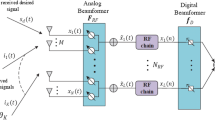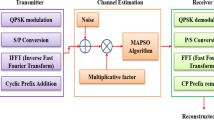Abstract
In wireless communication, multiple input multiple output-orthogonal frequency division multiplexing (MIMO–OFDM) plays a major role because of its high transmission rate. Channel estimation and tracking have many different techniques available in OFDM systems. Among them, the most important techniques are least square (LS) and minimum mean square error (MMSE). In least square channel estimation method, the process is simple but the major drawback is it has very high mean square error. Whereas, the performance of MMSE is superior to LS in low SNR, its main problem is it has high computational complexity. While comparing with LS and MMSE method individually, the combined LS and MMSE method using evolutionary programming can greatly reduce the error. If the error is reduced to a very low value, then an exact signal will be received. Thus, we propose a hybrid technique that includes particle swarm optimization (PSO) and genetic algorithm (GA) for channel estimation in MIMO–OFDM systems. The technique performs the conventional LS and MMSE channel estimation followed by enabling a fine tuning on the obtained channel model. The PSO and GA contribute in fine tuning the obtained channel model so that the channel model is derived further to correlate with the ideal model. The result shows the performance of the proposed method is better than LS and MMSE method in all the mutation and crossover values and also in all the iterations computed. The performance of OFDM systems using proposed technique can be observed from the imitation and relative results.

Similar content being viewed by others
References
Stüber, G.L.; Barry, J.; Mclaughlin, S.W.; Li, Y.G.; Ingram, M.A.; Thomas, G.: Broadband MIMO–OFDM wireless communications. Proc. IEEE 92(2), 271–294 (2004)
Nambirajan, S.; Sirikiat, A.; Li, Y.G: Channel estimation for OFDM systems with transmitter diversity in Mobile wireless channels. IEEE J. Sel. Areas Commun. 17(3), 461–471 (1999)
Winters, J.H.; Sollenberger, N.R.; Li, Y.G.: MIMO–OFDM for wireless communications: signal detection with enhanced channel estimation. IEEE Trans. Commun. 50(9), 1471–1477 (2002)
Chitra, M.P.; Srivatsa, S.K.: BER analysis of coded and uncoded MIMO–OFDM system in wireless communication. Indian J. Comput. Sci. Eng. 1(4) 357–363 (2010)
Sharma, A.K.; Uddin, M.; Sood, N.: On channel estimation of OFDM-BPSK and -QPSK over Nakagami-m Fading channels. Int. J. (SPIJ) 4, 239–246 (2010)
Omri, A.; Bouallegue, R.; Hamila, R.; Hasna, M.: Channel estimation for LTE uplink system by perceptron neural network. Int. J. Wirel. Mobile Netw. 2(3), 155–165 (2010)
Leus, G.; Barhumi, I.; Moonen, M.: Optimal training design for MIMO OFDM systems in mobile wireless channels. IEEE Trans. Signal Process. 51(6), 1615–1624 (2003)
Pirak, C.; Ray Liu, K.J.; Jitapunkul, S.; Jane Wang, Z.: Adaptive channel estimation using pilot-embedded data-bearing approach for MIMO–OFDM systems. IEEE Trans. Signal Process. 54(12), 4706–4716 (2006)
Xu, D.; Feng, G.; Wu, H.; Li, J.; Zhang, X.: Novel carrier frequency offset estimator in MIMO–OFDM system. Int. J. Digit. Content Technol. Appl. 5(3), 59–66 (2011)
Cicerone, M.; Simeone, O.; Spagnolini, U.: Channel estimation for MIMO–OFDM systems by modal analysis/filtering. IEEE Trans. Commun. 54(11), 2062–2074 (2006)
Ozbek, B.; Yilmaz, R.: The adaptive channel estimation for STBC–OFDM systems. J. Electr. Electron. Eng. 5(1), 1333–1340 (2005)
Wan, F.; Swamy, M.N.S.; Zhu, W.-P.: Linear prediction based semi-blind channel estimation forMIMO–OFDM system. IEEE International Symposium on Circuits and Systems, New Orleans, pp. 3239–3242 (2007)
Barry, J.R.; Lopes, R.R.: The extended-window channel estimator for iterative channel-and-symbol estimation. EURASIP J. Wirel. Commun. Netw. 2, 92–99 (2005)
Satya Prasad, K.; Naganjaneyulu, P.V.: An adaptive blind channel estimation of OFDM system by worst case H∞ approach. Int. J. Hybrid Inf. Technol. 2(4), 1–6 (2009)
Cimini, L.J.; Sollenberger, N.R.; Li, Y.G.: Robust channel estimation for OFDM systems with rapid dispersive fading channels. IEEE Trans. Commun. 46(7), 902–915 (1998)
Chua, B.K.; Fausty, O.; Pradhan, P.K.; Patra, S.K.: Channel estimation algorithms for OFDM systems. International Conference on Electronics Systems, National Institute of Technology, Rourkela, India, Jan 2011
Sang, T.; Lam, W.H.; Zeng, Y.: Semiblind channel estimation and equlization for MIMO space–time coded OFDM. IEEE Trans. Circuits Syst. 53(2), 463–474 (2006)
Wan, F.; Swamy, M.N.S.; Zhu, W.P.: A semiblind channel estimation approach for MIMO–OFDM systems. IEEE Trans. Signal Process. 56(7), 2821–2834 (2008)
Knievel, C.; Hoeher, P.A.: On particle swarm optimization for MIMO channel estimation. J. Electr. Comput. Eng. 2012 (2012) (Article ID 614384, 10 pages)
Quadeer, A.-N.: ML blind channel estimation in OFDM using cyclostationarity and spectral factorization. IEEE Eleventh International Workshop onSignal Processing Advances in Wireless Communications (SPAWC), pp. 1–5 (2010)
Gershman, A.B.; Sarmadi, N.; Shahbazpanahi, S.: Blind channel estimation in orthogonally coded MIMO–OFDM systems: a semi definite relaxation approach. IEEE Trans. Signal Process. 57(6), 2354–2364 (2009)
Bagadi, K.P.; Das, S.: MIMO–OFDM channel estimation using pilot carries. Int. J. Comput. Appl. 2(3), 81–88 (2010)
Berger, C.R.; Huang, J.; Huang, J.; Willett, P.; Zhou, S.: Iterative sparse channel estimation and decoding for underwater MIMO–OFDM. EURASIP J. Adv. Signal Process. 2010, 1–11 (2010)
Rana, M.M., Hosain, M.K.: Adaptive channel estimation techniques for MIMO OFDM systems. (IJACSA) Int. J. Adv. Comput. Sci. Appl. 1(6), 134–138 (2010)
Omri, A.; Bouallegue, R.: New transmission scheme for MIMO–OFDM system. Int. J. Next-Gener. Netw. 3(1), 11–19 (2011)
Basit, A.; Qamar-ul-Islam, A.; Saleem, S.; Aziz, W.: Performance evaluation of linear channel estimation algorithms for MIMO–OFDM in LTE-advanced. Int. J. Electr. Comput. Sci. IJECS-IJENS 11(3), 64–69 (2011)
Seyman, M.N.; Taspinar, N.:Particle swarm optimization for pilot tones design in MIMO–OFDM systems. EURASIP J. Adv. Signal Process. 2011, 1–10 (2011)
van de Jan-Jaap, B.; Sandell, M.; Edfors, O.: On channel estimation in OFDM systems. IEEE 45th Vehicular Technology Conference, Chicago, vol. 2, pp. 815–819 (1995)
Schober, K.; Wichman, R.: MIMO–OFDM channel estimation with Eigenbeamforming and user-specific reference signals. IEEE 69th Conference on Vehicular Technology Conference, pp. 1–5 (2009)
Vidhya, K.; Shankar Kumar, K.R.: Enhanced channel estimation technique for MIMO–OFDM systems with the aid of EP techniques. Eur. J. Sci. Res. 67(1), 140–156 (2011)
Author information
Authors and Affiliations
Corresponding author
Rights and permissions
About this article
Cite this article
Vidhya, K., Shankar Kumar, K.R. Channel Estimation of MIMO–OFDM System Using PSO and GA. Arab J Sci Eng 39, 4047–4056 (2014). https://doi.org/10.1007/s13369-014-0988-8
Received:
Accepted:
Published:
Issue Date:
DOI: https://doi.org/10.1007/s13369-014-0988-8




